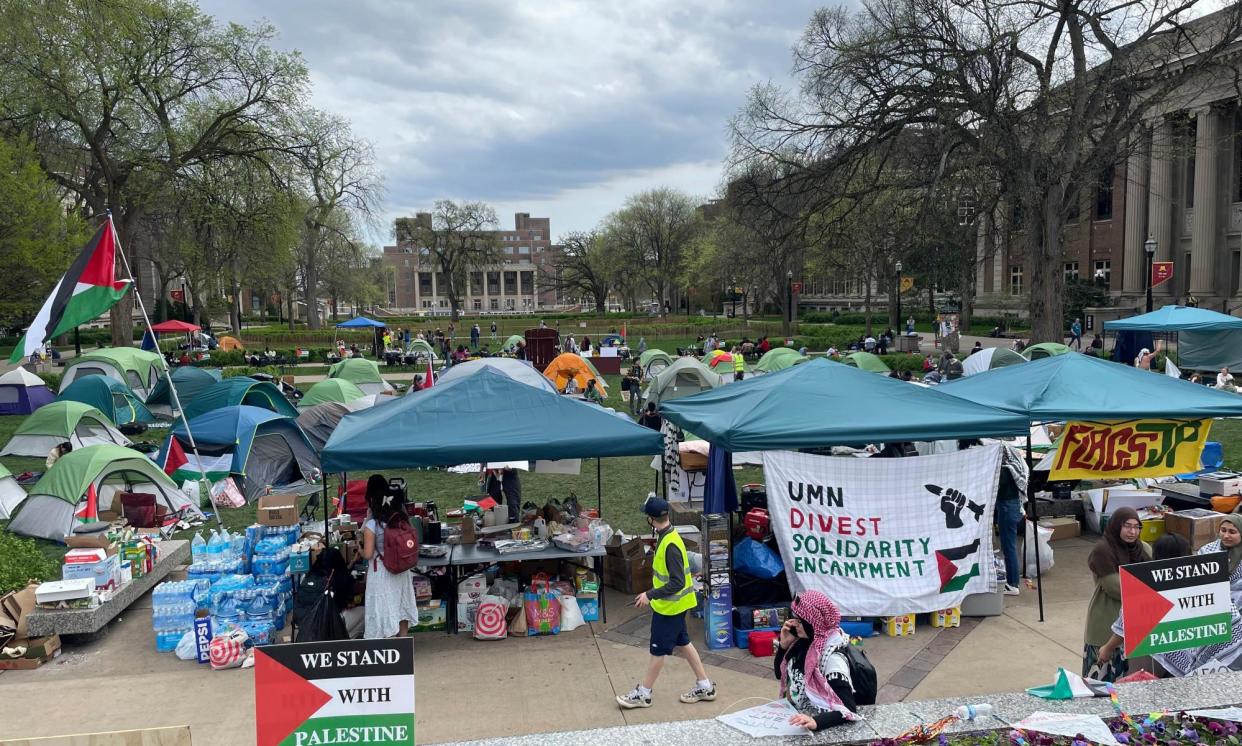Rutgers and University of Minnesota reach resolutions with Gaza protesters

Students at Rutgers University in New Jersey and the University of Minnesota in Minneapolis reached agreements with administrators on Thursday to peacefully dismantle their Gaza solidarity encampment protest.
Rutgers and the University of Minnesota now join Northwestern and Brown in successfully reaching deals to peacefully end their encampment protests.
Related: Union plans strike vote over crackdown on University of California Gaza protests
The peaceful resolutions are in contrast to the scenes at other universities in the US where pro-Palestinian protesters have been met with police violence after university administrations called on law enforcement to intervene and break up the encampments. More than 2,000 pro-Palestinian protesters have been arrested at campuses across the country.
The agreement at Rutgers was reached on Thursday after students met with administration to present their demands, some of which include: divesting from corporations participating in or benefiting from Israel; terminating Rutgers’ partnership with Tel Aviv University; accepting at least 10 displaced students from Gaza; and displaying the flags of occupied peoples – such as Palestinians, Kurds, and Kashmiris – alongside other existing international flags on campus.
Eight out of the 10 demands were met, but Rutgers students, faculty and alumni were still fighting for the remaining two: the actual call for divestment as well as severing ties with Tel Aviv University.
In an email, the RU Muslim alumni group wrote: “Even though most of the demands have been met, there is still much work to be done … These demands will require great effort and continuous pressure to bring to fruition and your continued support is still needed.”
Colleges, take note: Instead of sending riot police, Rutgers met with students, negotiated, agreed to 8/10 demands. Divestment, the biggest demand, was not among them -but they did secure a meeting with the committee on investments & will disband encampment.
These are the demands pic.twitter.com/5dqRLvRNkK— adelyreporter (@AdelyReporter) May 2, 2024
Just like 80 other universities across the country, Rutgers students established their own encampment earlier this week.
On Thursday morning, final exams at Rutgers were postponed due to the encampment protest, and university president Jonathan Holloway in an email threatened student demonstrators with police intervention if they did not “comply and disperse, clearing the area of their tents and belongings” by 4pm.
Shortly before 4pm, students began taking down their tents.
After four days, University of Minnesota students have also dismantled their encampment as of Wednesday, when interim university president Jeff Ettinger agreed to meet with protesters to hear their demands.
At Northwestern, university administration agreed to disclosing university investments, a community house for Middle Eastern and North African/Muslim students, and funding to support admitting Palestinian faculty and students.
Shortly after Northwestern protesters dismantled their encampment on Monday, Brown University followed suit. The Brown Corporation agreed to hold a vote on a divestment measure in October.
Campus encampment protests began taking place across the US after Columbia University students earlier this month pitched tents and began occupying the main lawn, igniting a worldwide movement that calls for universities to financially divest from Israel while it continues its military assault on Gaza and occupation of Palestinian land.

 Yahoo News
Yahoo News 
